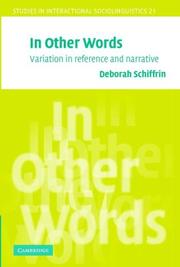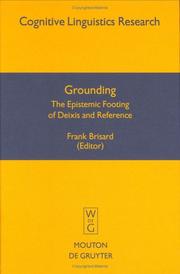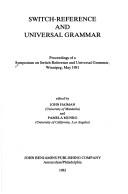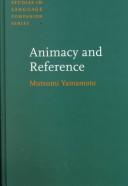| Listing 1 - 8 of 8 |
Sort by
|
Book
ISBN: 9027250502 1556193319 9781556193316 9789027250506 9789027282699 9027282692 9786613222060 6613222062 128322206X Year: 1996 Volume: n.s., 38 Publisher: Amsterdam Benjamins
Abstract | Keywords | Export | Availability | Bookmark
 Loading...
Loading...Choose an application
- Reference Manager
- EndNote
- RefWorks (Direct export to RefWorks)
The papers in this volume are concerned with the question of how a speaker's intended referent is interpreted by the addressee. Topics include the interpretation of coreferential vs. disjoint reference, the role of intonation, syntactic form and animacy in reference understanding, and the way in which general principles of utterance interpretation constrain possible interpretations of referring expressions. The collection arises from a workshop on reference and referent accessibility which was held at the 4th International Pragmatics Conference in Kobe, Japan, July 25-30, 1993.
Linguistics --- Pragmatics --- Reference (Linguistics) --- Référence (Linguistique) --- Congresses --- Congrès --- Language arts --- Signification (Linguistics) --- Onomasiology --- Semantics --- Reference (linguistique)
Book
ISBN: 284788176X 2847884343 9782847881769 Year: 2009 Publisher: Lyon: École normale supérieure,
Abstract | Keywords | Export | Availability | Bookmark
 Loading...
Loading...Choose an application
- Reference Manager
- EndNote
- RefWorks (Direct export to RefWorks)
Through the study of numerous Sanskrit technical texts, the present study aims to show and explain how the specificity of the semiotic status of proper names has been approached in the three traditional Indian disciplines of vy ā kara ṇ a (grammar), the ny at are (logical) and m ī m at m s at (exegesis), disciplines that put the reflection on language at the centre of their concerns. The question of the "meaning" of proper names has given rise to many reflections, both in the West and in India.If the debates, in the West, mainly concern logic and philosophy, linguistics participating only marginally, it is primarily grammarians ( vaiy à kara ṇ a ) and logicians ( naiy à yika ) who, in India, got hold of the problem. This work shows how the former mostly defended the idea that proper nouns denote and connote, while among the latter, it is the idea of a direct denotation, without connotation, which was most often supported.
Names, Personal --- Names, Sanskrit --- Related Historical Sciences --- History & Archaeology --- Genealogy --- Sanskrit language --- Sanskrit names --- Names --- Names, Personal - India --- nom propre --- convention linguistique --- langues indiennes --- référence (linguistique) --- sanskrit
Book
ISBN: 9782847887983 2847887989 2847888004 2847887997 9782847887990 9782847888003 Year: 2016 Publisher: Lyon ENS Editions
Abstract | Keywords | Export | Availability | Bookmark
 Loading...
Loading...Choose an application
- Reference Manager
- EndNote
- RefWorks (Direct export to RefWorks)
"Cet ouvrage regroupe un ensemble de contributions scientifiques destinées à éclairer divers aspects des recherches menées en France durant ces quarante dernières années autour de la cohésion et de la cohérence des textes. Les auteurs réunis dans ce volume ont ainsi souhaité rendre hommage à leur collègue et ami le professeur Michel Charolles, dont les nombreux travaux constituent un apport majeur au développement de la linguistique textuelle en France. Un accent particulier y est mis sur sa vision renouvelée des marqueurs de cohésion discursive, à la suite de ses travaux sur "l'encadrement du discours" (1997). Ces marqueurs qui guident l'interprétant dans l'accès à la cohérence du discours se regrouperaient en deux grandes familles : les marqueurs de connexion d'une part, d'indexation d'autre part. Les premiers, qui réunissent les marqueurs de continuité référentielle (anaphores) et les marqueurs de relations entre les contenus propositionnels et/ou les actes de langage (connecteurs), permettent d'établir des liens de cohésion discursive avec le cotexte amont. Les seconds, projectifs, exercent leur portée vers le cotexte aval et permettent au locuteur d'indexer des segments textuels potentiellement étendus au sein d'unités sémantico-pragmatiques que Michel Charolles a proposé de nommer "cadres de discours".
Discourse analysis. --- Cohesion (Linguistics) --- Référence (linguistique) $2 rameau --- Cohérence (linguistique) $2 rameau --- Marqueurs discursifs $2 rameau --- Cohesion (Linguistics). --- French language --- Pragmatics --- Référence (linguistique) --- Cohérence (linguistique) --- Marqueurs discursifs --- Marqueurs discursifs. --- Référence (linguistique) --- Cohérence (linguistique) --- Linguistics --- cohérence --- indexation --- cohésion --- texte --- coherence --- cohesion --- connection --- text --- Discourse analysis
Book
ISBN: 9780262034555 0262034557 0262335328 9780262335324 9780262335317 026233531X 0262335336 Year: 2016 Publisher: Cambridge, Mass. The MIT Press
Abstract | Keywords | Export | Availability | Bookmark
 Loading...
Loading...Choose an application
- Reference Manager
- EndNote
- RefWorks (Direct export to RefWorks)
"To communicate, speakers need to make it clear what they are talking about. The act of referring, which anchors words to things, is a fundamental aspect of language. In this book, Kees van Deemter shows that computational models of reference offer attractive tools for capturing the complexity of referring. Indeed, the models van Deemter presents cover many issues beyond the basic idea of referring to an object, including reference to sets, approximate descriptions, descriptions produced under uncertainty concerning the hearer's knowledge, and descriptions that aim to inform or influence the hearer. The book, which can be read as a case study in cognitive science, draws on perspectives from across the cognitive sciences, including philosophy, experimental psychology, formal logic, and computer science. Van Deemter advocates a combination of computational modeling and careful experimentation as the preferred method for expanding these insights. He then shows this method in action, covering a range of algorithms and a variety of methods for testing them. He shows that the method allows us to model logically complicated referring expressions, and demonstrates how we can gain an understanding of reference in situations where the speaker's knowledge is difficult to assess or where the referent resists exact definition. Finally, he proposes a program of research that addresses the open questions that remain in this area, arguing that this program can significantly enhance our understanding of human communication"--MIT CogNet.
Lexicology. Semantics --- Psycholinguistics --- Mathematical logic --- Mathematical linguistics --- Reference (Linguistics) --- Presupposition (Logic) --- Computational linguistics. --- Référence (linguistique) --- Présupposition (logique) --- Linguistique --- Informatique --- Informatique. --- Signification (Linguistics) --- Linguistics --- Onomasiology --- Semantics --- Automatic language processing --- Language and languages --- Language data processing --- Natural language processing (Linguistics) --- Applied linguistics --- Cross-language information retrieval --- Multilingual computing --- Language and logic --- Logic --- Data processing --- LINGUISTICS & LANGUAGE/General --- COGNITIVE SCIENCES/General --- COMPUTER SCIENCE/General

ISBN: 9780521484749 9780521481595 052148474X 0521481597 9780511616273 0511146108 9780511146107 051114654X 9780511146541 0511147112 9780511147111 0511616279 1280414685 9781280414688 9786610414680 6610414688 1107141567 0511184069 0511322771 Year: 2006 Volume: 21 Publisher: Cambridge, UK ; New York : Cambridge University Press,
Abstract | Keywords | Export | Availability | Bookmark
 Loading...
Loading...Choose an application
- Reference Manager
- EndNote
- RefWorks (Direct export to RefWorks)
What we say always consists of prior words, structures and meanings that are combined in new ways and re-used in new contexts for new listeners. In this book, Deborah Schiffrin looks at two important tasks of language - presenting 'who' we are talking about (the referent) and 'what happened' to them (their actions and attributes) in a narrative - and explores how this presentation alters in relation to emergent forms and meanings. Drawing on examples from both face-to-face talk and public discourse, she analyses a variety of repairs, reformulations of referents, and retellings of narratives, ranging from word-level repairs within a single turn-at-talk, to life story narratives told years apart. Bringing together work from conversation analysis, interactional sociolinguistics, cognitive semantics, pragmatics, and variation analysis, In Other Words will be invaluable for scholars wishing to understand the many different factors that underlie the shaping and re-shaping of discourse over time, place and person.
Reference (Linguistics) --- Narration (Rhetoric) --- Sociolinguistics. --- Référence (Linguistique) --- Narration --- Sociolinguistique --- Narration (Rhetoric). --- Reference (Linguistics). --- Référence (Linguistique) --- Sociolinguistics --- Language and languages --- Language and society --- Society and language --- Sociology of language --- Language and culture --- Linguistics --- Sociology --- Integrational linguistics (Oxford school) --- Signification (Linguistics) --- Onomasiology --- Semantics --- Narrative (Rhetoric) --- Narrative writing --- Rhetoric --- Discourse analysis, Narrative --- Narratees (Rhetoric) --- Social aspects --- Sociological aspects --- Arts and Humanities --- Language & Linguistics

ISBN: 3110173697 3111856518 3110899809 9783110899801 9783110173697 Year: 2002 Volume: 21 Publisher: New York ; Berlin Walter de Gruyter
Abstract | Keywords | Export | Availability | Bookmark
 Loading...
Loading...Choose an application
- Reference Manager
- EndNote
- RefWorks (Direct export to RefWorks)
This compilation of invited contributions, gathering an international collection of cognitive and functional linguists, offers an outline of original empirical work carried out in grounding theory. Grounding is a central notion in cognitive grammar that addresses the linking of semantic content to contextual factors that constitute the subjective ground (or situation of speech). The volume illustrates a growing concern with the application of cognitive grammar to constructions establishing deixis and reference. It proposes a double focus on nominal and clausal grounding, as well as on ways of integrating analyses across these domains.
Cognitieve spraakkunst --- Cognitive grammar --- Cognitive linguistics --- Grammaire cognitive --- Grammar [Cognitive ] --- Linguistique cognitive --- Psycholinguistique cognitive --- Reference (Linguistics) --- Référence (Linguistique) --- Spraakkunst [Cognitieve ] --- Verwijzing (Taalwetenschap) --- Linguistics --- Philosophy of language --- Comparative linguistics --- Grammar --- Pragmatics --- Cognitive grammar. --- Grammar, Comparative and general --- Deixis. --- Signification (Linguistics) --- Deixis (Linguistics) --- Deictic function --- Onomasiology --- Semantics --- Indexicals (Semantics) --- Psycholinguistics --- Grammar [Comparative and general ] --- Deixis --- Philology

ISBN: 1283314215 9786613314215 9027280266 9789027280268 9781283314213 6613314218 9027228620 9027228663 9789027228666 Year: 1983 Volume: 2 Publisher: Amsterdam: Benjamins,
Abstract | Keywords | Export | Availability | Bookmark
 Loading...
Loading...Choose an application
- Reference Manager
- EndNote
- RefWorks (Direct export to RefWorks)
Canonical switch-reference is an inflectional category of the verb, which indicates whether or not its subject is identical with the subject of some other verb. Switch-reference may be analyzed from a structural or a functional point of view. Functionally, switch-reference is a device for referential tracking. Formally, switch-reference is almost always a verbal category, similar to the familiar category of verbal concord. In most languages switch-reference marking is indicated by a verbal affix, however in some languages it may be marked by an independent morpheme. The contributions to this v
Indians --- Grammar, Comparative and general --- Language and languages --- Languages --- Linguistique --- --Typologie --- --Grammaire générale --- --Grammar, Comparative and general --- Typology (Linguistics) --- Switch-reference --- Congresses --- Agreement --- Verb --- Grammar --- Referentie [Taalwetenschap]. (Congres) --- Overeenkomst [Spraakkunst]. (Congres) --- Accord [Grammaire]. (Congrès) --- Verbe. Syntaxe. (Congrès) --- Référence [Linguistique]. (Congrès) --- Werkwoord. Syntaxis. (Congres) --- Linguistics --- Philology --- Typologie --- Grammaire générale --- Grammar, Comparative and general - Switch-reference - Congresses --- Grammar, Comparative and general - Agreement - Congresses --- Grammar, Comparative and general - Verb - Congresses --- Typology (Linguistics) - Congresses

ISSN: 01657763 ISBN: 9027230498 1556199325 9786612162992 1282162993 9027298769 9781556199325 9789027230492 Year: 1999 Volume: 46 Publisher: Amsterdam: Benjamins,
Abstract | Keywords | Export | Availability | Bookmark
 Loading...
Loading...Choose an application
- Reference Manager
- EndNote
- RefWorks (Direct export to RefWorks)
The concept of 'animacy' concerns the fundamental and cognitive question of the extent to which we recognize and express living things as saliently human-like or animal-like.In Animacy and Reference Mutsumi Yamamoto pursues two main objectives: First, to establish a conceptual framework of animacy, and secondly, to explain how the concept of animacy can be reflected in the use of referential expressions. Unlike previous studies on the subject focussing on grammatical manifestations, Animacy and Reference sheds light upon the conceptual properties of animacy itself and its r
Psycholinguistics --- English language --- Grammar --- Japanese language --- Grammar, Comparative and general --- Reference (Linguistics) --- Animacy --- Grammar, Comparative --- Japanese. --- English. --- Référence (Linguistique) --- Verwijzing (Taalwetenschap) --- Grammar [Comparative and general ] --- Grammar [Comparative ] --- Japanese --- English --- Linguistique. (Collection) --- Taalwetenschap. (Reeks) --- English language -- Animacy. --- English language -- Grammar, Comparative -- Japanese. --- Grammar, Comparative and general -- Animacy. --- Japanese language -- Animacy. --- Japanese language -- Grammar, Comparative -- English. --- Reference (Linguistics). --- Philology & Linguistics --- Languages & Literatures --- Koguryo language --- Germanic languages --- Signification (Linguistics) --- Linguistics --- Onomasiology --- Semantics --- Philology --- Grammar, Comparative and general - Animacy --- English language - Animacy --- Japanese language - Animacy --- English language - Grammar, Comparative - Japanese. --- Japanese language - Grammar, Comparative - English. --- Animacy.
| Listing 1 - 8 of 8 |
Sort by
|

 Search
Search Feedback
Feedback About UniCat
About UniCat  Help
Help News
News